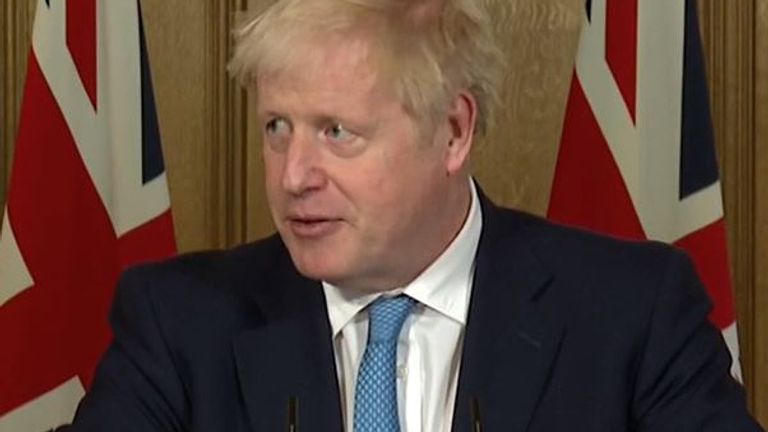Greater Manchester residents will have Tier 3 coronavirus restrictions imposed on them even if local leaders do not agree, Boris Johnson has warned.
Speaking at a news conference from Downing Street, flanked by chief scientific adviser Sir Patrick Vallance, and government medical adviser Dr Susan Hopkins, the prime minister said: “If agreement cannot be reached, I will need to intervene in order to protect Manchester’s hospitals and save the lives of Manchester residents.”
He added the situation there was “grave” and “worsens with each passing day”, and that action was needed to avoid more people going into intensive care and dying.
It comes as Lancashire prepares to follow the Liverpool City Region into Tier 3 – the highest level of COVID-19 restrictions in England – from midnight tonight.
Manchester’s leaders have been resisting following suit until a stronger support package to protect workers and businesses is pledged by the government.
Talks have been going on for several days but no agreement has yet been reached, after acrimony broke out on Thursday.
In a plea to Andy Burnham, the mayor of Greater Manchester, Mr Johnson told him to “reconsider and engage constructively” as “time is of the essence”.
However, Sir Patrick said “baseline” Tier 3 measures “almost certainly aren’t enough” to get infection numbers down.
And asked when asked by Sky’s deputy political editor Sam Coates if people would die as a result of the row between Downing Street and Manchester leaders, he said: “These are horrendously difficult decisions and there are harms on both sides, as it’s been pointed out previously.
“From a purely epidemiological point of view, it is important to go quite fast on this, it’s important to make sure that you go hard enough to get the R below 1 and the sooner you do that, the sooner you get this under control.”
The number of people in intensive care beds in Greater Manchester is already 40% over what it was during the first peak in spring and the case rate has risen to 224 per 100,000 among the over 60s, the prime minister said.
“The national government must reserve the right to step in and do what is necessary,” Mr Johnson added.
He also laid out plans to distribute and trial rapid testing to “help stop the virus’ vicious spread”.
Liverpool mayor Joe Anderson earlier branded the changes to the three-tier system unveiled on Monday by Mr Johnson an “inconsistent mess”.
Meanwhile, the R rate – the average number of people someone with coronavirus passes it on to – has risen slightly from between 1.2-1.5 to 1.3-1.5 this week.
SAGE, the government’s group of scientific advisers, said the estimate was “reliable” and there is “still widespread growth of the epidemic across the country”.




